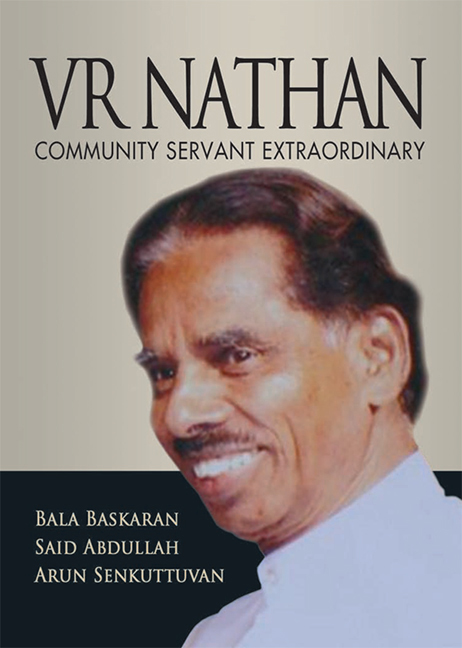Book contents
- Frontmatter
- Contents
- Foreword
- Message
- Preface
- Acknowledgements
- 1 VR's Inter-religious Leadership
- 2 An Immigrant who Made Good
- 3 Introduction to Temple Management Affairs
- 4 Invitation to Help out HEB
- 5 An Era of Change in HEB
- 6 VR's Signal Contribution to HEB's Transformation
- 7 Celebrating Hindu Festivals
- 8 Transforming the Temple Scene
- 9 VR's Views in Public Deliberations of Issues Affecting Indians
- 10 VR's Legacy
- Appendix
- About the Authors
- Plate section
Preface
Published online by Cambridge University Press: 21 October 2015
- Frontmatter
- Contents
- Foreword
- Message
- Preface
- Acknowledgements
- 1 VR's Inter-religious Leadership
- 2 An Immigrant who Made Good
- 3 Introduction to Temple Management Affairs
- 4 Invitation to Help out HEB
- 5 An Era of Change in HEB
- 6 VR's Signal Contribution to HEB's Transformation
- 7 Celebrating Hindu Festivals
- 8 Transforming the Temple Scene
- 9 VR's Views in Public Deliberations of Issues Affecting Indians
- 10 VR's Legacy
- Appendix
- About the Authors
- Plate section
Summary
When Ambassador K Kesavapany, Director of the Institute of Southeast Asian Studies, invited me to write a book on VR Nathan, who served the longest as Chairman of Hindu Endowments Board (HEB), my immediate response was: “Shouldn't the book be on President Nathan rather than on VR Nathan? What did VR do that the President didn't want him to do?” My reaction was instant, as Ambassador Kesavapany's invitation was an unexpected one, and uninformed, as I have now learnt. Sure, VR was SR Nathan's man when he was appointed to HEB. That was how everyone who dealt with him since then saw him. That impression was confirmed by the research that Bala Baskaran and Said Abdullah undertook for this book and in all the interviews I participated in. But we also learnt that VR was more than a President's man.
VR well understood what was expected of him but on many occasions, within the parameters set earlier by President Nathan, responded spontaneously and earnestly to initiatives taken by others and thereby won their eternal friendship and support. Perhaps all President Nathan's men are like that. Perhaps that's how the President chooses and mentors his men. For us, it was a pleasant discovery and made us understand the basis of the strong bondage that VR had also built with most leaders of other religions in Singapore.
This was an aspect of VR's later life that was not meaningfully publicized in the media and not appreciated by any of us when we started on this project. The function of the Inter-Religious Organisation (IRO) itself, we suspect, is not as widely understood by Singaporeans as it should be. Be that as it may, what struck me and Said Abdullah, each with a couple of decades of reporting experience, was the emotional state in which we found Lee Bock Guan, Rustom M Ghadiali and Haji Abu Bakar Maidin when we interviewed them. All three were very mature leaders steeped in their religious learning and traditions and not easily given to emotionally breaking down when discussing the loss of a fellow pilgrim. Their words, and what they said they could never adequately describe in words, were the ultimate testimony to VR's valuable contribution to their collective efforts to maintain religious harmony in Singapore.
- Type
- Chapter
- Information
- VR NathanCommunity Servant Extraordinary, pp. xiii - xviiiPublisher: ISEAS–Yusof Ishak InstitutePrint publication year: 2012

